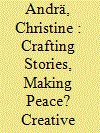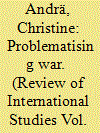|
|
|
Sort Order |
|
|
|
Items / Page
|
|
|
|
|
|
|
| Srl | Item |
| 1 |
ID:
184138


|
|
|
|
|
| Summary/Abstract |
This article examines the analytical and political potentials of creative methods for peace research. Specifically, the article argues that creative methods can textile, i.e. render material and irregularly textured, (research on) post-conflict politics. Grounded in a collaborative research project with former combatants in Colombia, the article takes this project’s methods – narrative practice, textile-making, and a travelling exhibition – as examples to demonstrate how creative methods’ element of making contributes to the development of post-conflict subjectivities and relationships. Casting the data generated by creative methods as crafted stories, the article also shows how in these stories, semantic meaning becomes entangled with material traces of emotional, affective, and embodied experiences of violence and its aftermath, effecting a shift in the post-conflict distribution of the sensible. By exploring creative methods’ capacity for textiling peace (research), the article contributes to research on creativity, the arts, and peace and on the post-conflict trajectories of former combatants.
|
|
|
|
|
|
|
|
|
|
|
|
|
|
|
|
| 2 |
ID:
187034


|
|
|
|
|
| Summary/Abstract |
This article redirects extant critiques of the modern problem of war at this problem's underlying logic of deviance. According to this logic, war constitutes a kind of international conduct that contravenes behavioural norms and that can be corrected through diagnostic and didactic means. Thereby, war is rendered into a problem falling within the scope of human agency. However, this agency rests on and reproduces this logic's constitutive blind spots. Therefore, it seems imperative to develop ways of problematising war otherwise. The article provides two starting points for (critical) IR scholarship seeking to undertake such a project. Firstly, it combines two Foucaultian tools, the concept of problematisation and the method of genealogy, to direct critique at the logics underlying our evaluative – analytical, ethical, and political – judgements. Secondly, it uses these tools to trace the contingent emergence of the logic of deviance in a crucial example within the wider genealogy of the problem of war: the Carnegie Endowment's commission of inquiry into the Balkan Wars of 1912 and 1913. Based on original archival research, I highlight different elements of this inquiry's problematisation of war – its frames, assumptions, ways of knowing, and subjects of knowledge – to make them available for reconstruction.
|
|
|
|
|
|
|
|
|
|
|
|
|
|
|
|
|
|
|
|
|